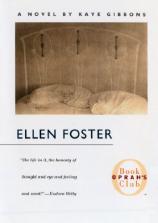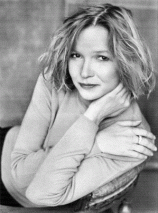Ellen Foster
About the Book
Ellen Foster
The questions and discussion topics that follow are intended to enhance your group's reading of Kaye Gibbons's Ellen Foster. We hope they will give you a number of interesting angles from which to approach this harrowing yet often hilarious story of an abandoned child's search for her place in the world.
"When I was little I would think of ways to kill my daddy," [p. 1] says eleven-year-old Ellen. Thus the young narrator begins her life-story, in the process painting an extraordinary self-portrait: Ellen is a child whose courage and humor win her a place in literature alongside J. D. Salinger's Holden Caulfield. Ellen's first eleven years are a long fight for survival. Her invalid, abused mother commits suicide, leaving Ellen to the mercies of her daddy, a drunken brute who either ignores her or makes sexual threats. Through her intelligence and grit Ellen is able to provide for herself, but her desperate attempts to create an environment of order and decorum within her nightmarish home are repeatedly foiled by her father. After his death, a judge awards Ellen's custody to her mother's mother, a bitter and vengeful woman who hated her son-in-law for ruining her own daughter's life and who hates the child Ellen for her physical resemblance to him.
Against all odds, Ellen never gives up her belief that there is a place for her in the world, a home which will satisfy all her longing for love, acceptance, and order. Her eventual success in finding that home and courageously claiming it as her own is a testimony to her unshakable faith in the possibility of good. She never loses that faith, and she never loses her sense of humor. Ellen Foster, like another American classic, Huckleberry Finn, is for all its high comedy ultimately a serious fable of personal and collective responsibility.
Ellen Foster
- Publication Date: January 12, 1987
- Hardcover: 168 pages
- Publisher: Algonquin Books
- ISBN-10: 1565122054
- ISBN-13: 9781565122055










